By Jaimie Kaffash
18 August 2010
Employee-owned organisations are not an easy way of making savings, according to the head of a think-tank that will be working closely with the government’s mutual pilot projects.
The Cabinet Office last week announced the setting up of 12 ‘pathfinders’ to pilot employee-owned public services. The services involved range from health to education and will be led by expert mentors including the big accountancy firms, the John Lewis Partnership and the Office for PublicManagement, an employee-owned think-tank.
But Hilary Thompson, chief executive of the OPM, told Public Finance that ministers could not count on this new public service model making huge savings. Although productivity would be likely to increase, any cut in funding would affect the provision of services regardless of the model of the organisation.
‘It is important to be clear about what funding is available and then look at models of service provision,’ she said. ‘We must not encourage people to move to new models of service provision and then saying “oh, by the way, there is only 30% of funding [available]”.
‘There has to be transparency or it is not setting it up to succeed. We have to be realistic in that there are savings having to be made, but the commissioners must be transparent about what funding is available and not use it as a cover for making cuts.’
The pathfinder experiment was welcome, Thompson added, but employee-ownership has its limitations.
‘If you are in services where it can’t be allowed to fail, then the commissioners must think about what could happen.
‘But we are not talking about it applying to everything, or one size fits all. We are talking about trying to have a wider range of providers in the whole marketplace and seeing what types of models work best for what types of services,’ she said.
Employee-owned organisations are most efficient when there is strong input from all levels, she added. ‘In terms of public services making the transition, we need to be focusing on the current leaders and asking what they can do.
‘It is very important that trade unions are involved in the debate. There must be clarity over the rights of staff, and what terms are protected.’
In a videointerview with PF, Heather Wakefield, head of local government at Unison, said the union had a number of concerns about mutual models for public services, particularly the risk of depressing terms and conditions for public sector workers.


















